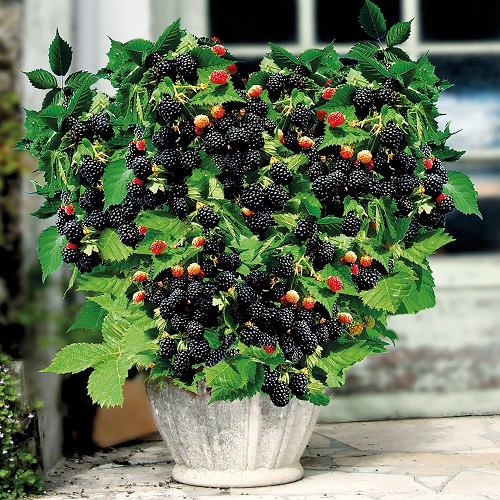If you are wondering, How to Grow Blackberries in Pots, this detailed guide will help you with all the necessary information!
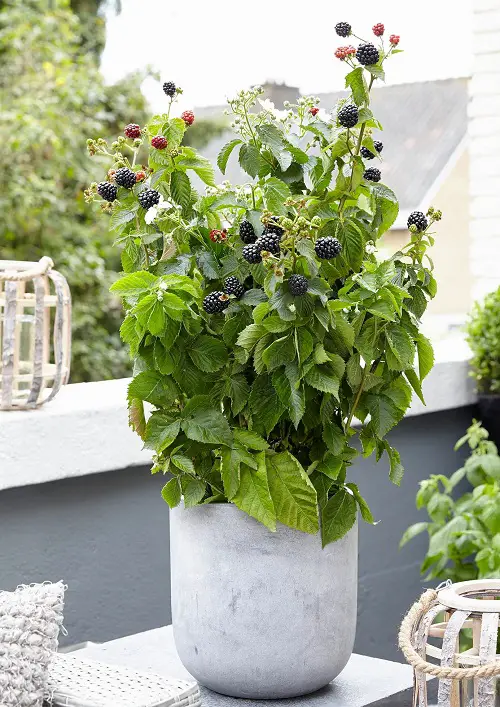
If you love to munch on juicy, tarty fruits, you must grow one at home! Learn How to Grow Blackberries in Pots and enjoy a plateful of them!
Do you know What is the Alabama State Fruit? Learn here
Blackberry Plant Profile
Blackberries are glossy fruits that change their color from green to pink, red, purple, and finally black as they ripen. The juicy fruit develops from five-lobed white flowers and grows in clusters on the thorny stems. The stems can be arching, erect or vining, depending on the variety.
Find out the Best Berries for Hanging Baskets here
Ideal Pot Size
Get a 24-30 inches pot as the main stem sends out shoots carrying more fruits. Therefore, the wider pot you get, the more the harvest will be.
You can also grow blackberries in whiskey barrels, fruit crates, cement pots, large storage boxes, or hanging baskets for ornamental purposes. Ensure the container has enough holes to drain out excess water.
Wondering How to Grow Blueberries in Pots? Click here
Best Blackberry Varieties for Containers
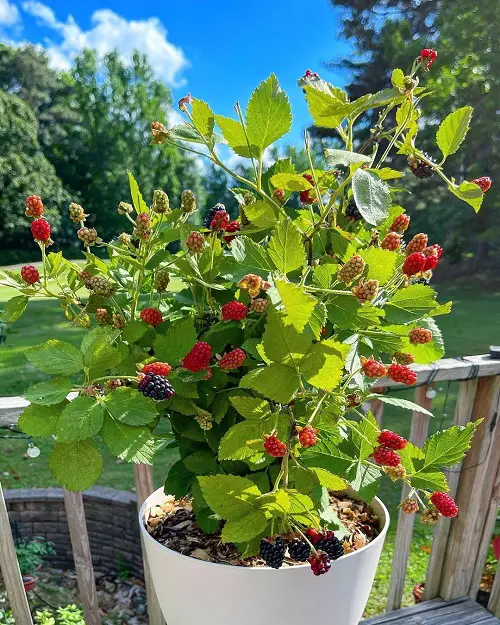
Blackberry trees can grow as tall as 10 feet. However, while growing in containers, go for the dwarf varieties:
- Baby Cakes: A dwarf variety, grows to a height of 3-4 feet and thrives in full sunlight.
- Apache: The thornless bushes grow to a height of 3-6 feet and produce the sweetest berries.
- Kiowa: The canes can reach up to 5 feet and produce large, glossy, and tasty berries.
- Prime-Ark: Upright arching canes that grow to 4-5 feet and produce tarty, juicy berries.
Propagating Blackberries
The easiest way to propagate blackberries is via stem cuttings. However, more methods like root division, suckers, and tip layering require more effort and patience.
- Get a 5-6 inches long leafy stem cutting from a healthy blackberry bush.
- Remove the bottom leaves and scratch the cut end a little.
- Prepare a pot with a well-draining potting mix and tuck the stem in it.
- Leave the pot in a shady location. Keep the medium moist and watch it grow.
Most blackberry varieties grow fruits from the third year of planting, so you can get a healthy plant from a nursery and pot it in your home to enjoy early fruits.
Requirements for Growing Blackberries in Pots
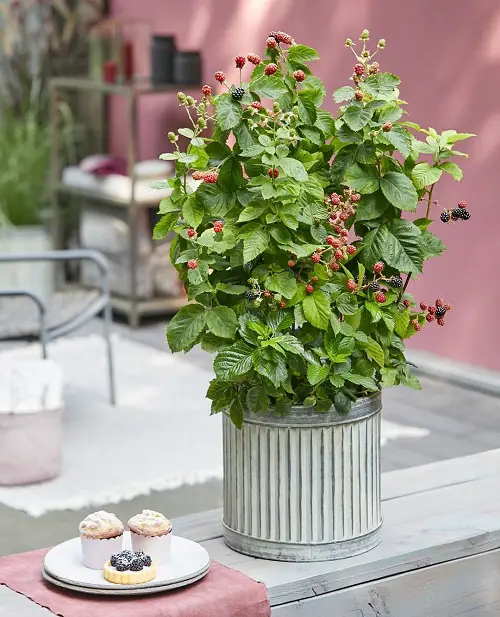
Sunlight
Blackberries need 5-6 hours of direct sunlight to grow the juiciest fruits. However, the plants can tolerate a little shade occasionally but won’t fruit if exposed to prolonged low-light conditions.
Place the pot in the sunniest spot in your garden or on a south-facing window for the best results.
Temperature & Humidity
The ideal temperature range for blackberries growing in containers is 50-90 F or 10-32 C. Bring the plant indoors in extreme temperatures and keep the plant away from heating or cooling vents.
Also, the plant loves high levels of humidity. Use a humidifier or pebble tray to make up for the dry days.
Soil
The plant prefers well-draining loamy soil with a pH of 5.5-6.5. Ensure the medium does not retain water for long as it may cause root rot. Amend the soil with perlite, sand, and organic matter to aid drainage.
Water
Blackberries grow best in a moist medium. However, ensure that the soil does not get waterlogged as that may yield pests and root rot. Water when the top one inch feels dry to the touch.
Discover the Most Exotic Fruits from Around the World here
Blackberry Plant Care
Fertilizers
Feed the plant with a balanced liquid fertilizer diluted to half its strength during the growing months. You may also side-dress the plant with granular feed at the onset of flowers.
If you have propagated a blackberry plant at home, avoid fertilizing in the first year as it will burn the foliage due to salt build-up.
Pests and Diseases
The common pests include leaf spots, orange rust, botrytis, and powdery mildew. Shower the plant with insecticidal soap or neem oil solution to fight these pests.
Mulch
Mulching the plant is important to suppress weeds and retain moisture in the medium. Layer with an inch of dried leaves, birch chips, straw, or shredded wood for an effective mulch.
Harvesting Blackberries
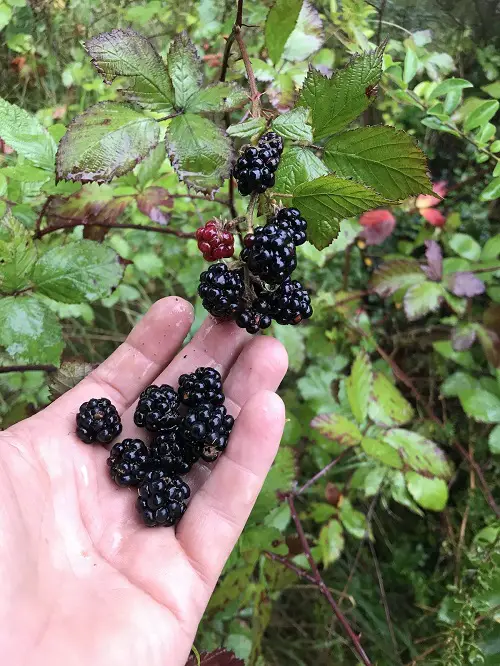
It’s important to carefully follow the development of your ripening blackberries because they are highly perishable. Immature berries start green in color and then turn to red before maturing in a glossy, deep black shade. The berries do not continue to ripen after harvest, so ensure to pick the berries only when they are entirely black.
You can store the fruit in the refrigerator for 7-10 days after harvest.


